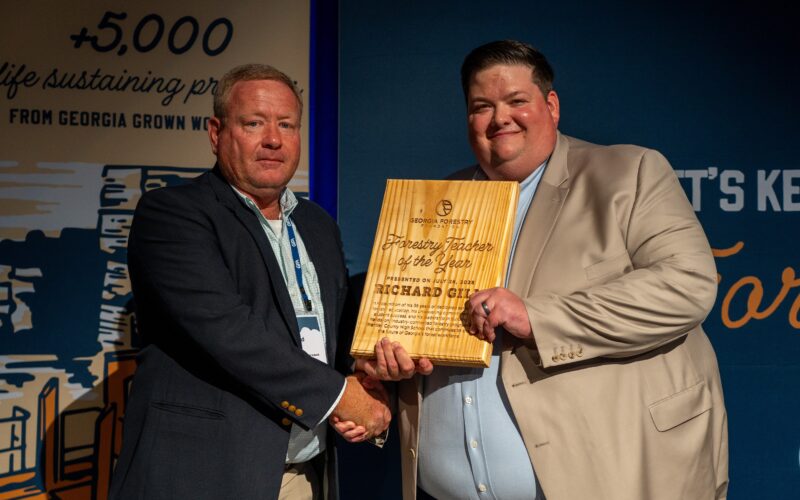Research from the University of Georgia’s Warnell School of Forestry & Natural Resources, made possible with support from the Georgia Forestry Foundation and the Forest Resources Association, is initiating policy discussions on the safety, efficiency and cost savings of allowing log trucks to utilize interstate highways when transporting logs from the woods to a mill.
Logging business owners and the forest products industry have advocated for weight parity between Interstate Highways and state and U.S. highways for many years. In Georgia, the weight limit on state and U.S. highways is 84,000 pounds total, including 48,300 pounds per two axles (including state weight tolerances)—limits that allow logging trucks to haul their loads to mills that are often located in metro areas. But on interstate highways, log trucks are limited to 80,000 total pounds, including 34,000 pounds per set of axles. Log trucks operating on interstate highways must also comply with the Federal Bridge Formula requirements. Consequently, loaded log trucks rarely travel on Interstate Highways in the South.
Research led by Dr. Joe Conrad, Assistant Professor of Forest Operations at Warnell, set out to quantify the benefits of shifting log trucks from backroads and highways to Interstates.
“The federal government sets weight limit laws for the interstates, which have been in place since 1974,” said Conrad in an article published in UGA Today. “So, the goal of the research was, if you made the weight limit the same on interstate and state highways, would it improve the efficiency and safety of our timber transportation industry? The results were a resounding yes.”
Safety, Cost-Effectiveness and Efficiency of Shifting to Interstates
From a safety perspective, major improvements were observed on interstate routes compared to current routes that avoid interstate highways, including significantly fewer intersections, school zones, stop signals, and high-traffic urban areas. Across the eight areas observed, when log trucks used the interstates, they could reduce the number of stoplights they encounter by 33 percent and avoid one school zone per trip.
“Many of Georgia’s large mills are located in Macon, Augusta, Savannah, Brunswick—relatively large areas,” Conrad said. “So, they have to drive through downtown Macon, for example, to get to the paper mill there. Plus, you have pedestrian movement. It’s needlessly unsafe for them.”

Hauling cost savings were also observed in six of the eight wood baskets analyzed. Estimated annual savings for a typical logging business ranged from $3,369 in the Prattville, AL wood basket to more than $20,000 in the Augusta, GA and Brewton, AL wood baskets. Cumulative estimated annual savings across all eight wood baskets totaled $7.4 million.
In addition to the safety and cost savings benefits, Dr. Conrad said switching to interstates reduced travel time, fuel consumption and CO2 emissions. In addition, pavement damage was reduced significantly in every wood basket when log trucks traveled on interstate highways. Across all eight wood baskets, annual pavement damage costs were reduced by an estimated $4.9 million when log trucks shifted to interstate routes.
“As you know from traveling the interstate, it’s usually faster than traveling the backroads. So, I found the interstate was quicker by about eight minutes per trip, from the routes we looked at. If you think about all the loads of timber that are moved every year, that adds up real quick,” said Conrad. “Trying to drive a log truck through Augusta is pretty slow and hazardous, so in addition to it being a lot safer, bypassing the city on the interstate would reduce fuel consumption, lower C02 emissions, and cause less damage to the pavement, because interstate highways are engineered to a higher standard than state and U.S. highways.”
Using Data to Inform Federal Legislation
Applying state weight limits to interstate highways would require federal legislation. Data from this study can now be used to inform legislative proposals such as the Safe Routes Act of 2019, sponsored by more than 19 members of congress including Rep. Sanford Bishop (D-GA), co-chair of the Congressional Caucus on Working Forests.
The Safe Routes Act would allow logging trucks that meet state-determined legal requirements to travel up to 150 air miles on the Federal Interstate Highway System, which a pilot program has shown to greatly reduce both fatal accidents and fossil fuel usage by trucks.
“Data that was gathered from this study will be key to communicating about this important issue and encouraging legislative action,” said Andres Villegas, President & CEO of the Georgia Forestry Association and Foundation. “We will continue to work with federal partners like the Forest Resources Association to support policy that is focused on providing access to interstate highways and driving value to the forestry sector.”
For more information about this issue, and to receive access to the full research report, contact Senior Vice President Matt Hestad at matt@gfagrow.org.







